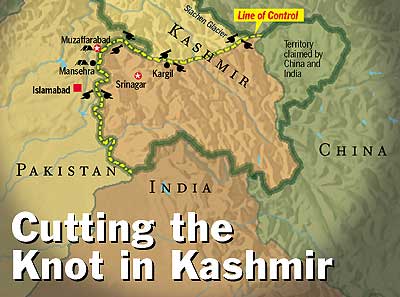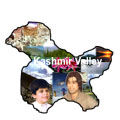|
|
Kashmir
Conflict
On
15 August, 1947 when the British relinquished their paramountcy
over India, the Maharaja of Kashmir Hari Singh Dogra wanted
to preserve the integrity of the state and therefore did not
accede to either dominion. Maharaja Hari Singh's decision
not to join either country, or rather his indecision since he
was far from being a decisive ruler, was a fateful one. Kashmir
is predominantly Muslim so on the basis of religion it should
clearly have gone to Pakistan. Geographically it is also more
closely aligned to Pakistan than India.
When the Pakistanis realised that Hari Singh, a Hindu was still
undecided they organised an unofficial take-over bid. Pathan
tribesmen from the north-west Frontier region moved into Kashmir
and internal revolts soon had Hari Singh's army in tatters.
He turned to India for assistance but the price was an obvious
one - Hari Singh opted for India. Had not Pathans been so busy
looting along their way to capturing Srinagar, it might have
been too late for India troops to save Kashmir. As it was, the
Pathans had still not reached Srinagar when the first India
troops were flown in and confronted them in Baramula. Nevertheless
a full-scale war between India and Pakistan was soon underway
and was not halted until a United Nations cease-fire came into
effect on 1 January 1949. A substantial part of Kashmir was
in Pakistan hand but the Vale of Kashmir was firmly under India
control.

The cease-fire line runs from Akhnoor northwards to near keran
on the Kishanganga - a rugged dry sparsely populated strip 25
km wide and 250 km long. From keran the line turns east and
passes through Minimarg in the Gurais Valley and ends in the
snow of the Karakoram Range. Gilgit, Hunza and Baltistan are
north of the line and under the control of the Pakistanis.
Initially Kashmir was run as an autonomous region with its own
government and president. Karan Singh, the Maharaja's son, was
the first to hold this office. Then in 1957 Kashmir was formally
made part of the India union. Despite Pakistani protests. Pakistan
has repeatedly requested that a referendum be held in Kashmir
and although India agreed to eventually hold such a referendum
there have always been reasons why it has not been conducted.Subsequent
UN efforts to secure troop withdrawals and develop a plebiscitary
plan satisfactory to both sides were unsuccessful. Heavy border
fighting broke out in 1965 and again in 1971, and led to the
"line of control" that has since formed the boundary
between the Indian- and Pakistani-controlled sections of Kashmir.
China began conducting military maneuvers in the border areas
of eastern Kashmir in the 1950s. Since the Sino-Indian war of
October 1962, the northeastern part of Ladakh, in the state
of Jammu and Kashmir, has been occupied by China. The Chinese
authorities have since built a strategic road throughout the
disputed territory, connecting Xinjiang Uygur with Tibet.
Unrest in the state of Jammu and Kashmir increased after 1988
as Kashmiri fighters began guerrilla attacks against Indian
officials and troops deployed in the state. India responded
by increasing its troop deployment in the region. Tensions increased
sharply beginning in early 1990, with violent clashes between
Indian troops and pro-independence demonstrators. President's
Rule was imposed by the Indian government in Jammu and Kashmir
in July 1990. Clashes between the Kashmiri fighters and Indian
troops continued throughout the early 1990s. The situation further
strained relations between India and Pakistan; Pakistani Prime
Minister Benazir Bhutto gave public support to the Kashmiri
fighters. In January 1994 the two governments held talks concerning
Kashmir, but no significant progress was made. In 1994 and in
the first half of 1995 there was a new upsurge in guerrilla
activity. Peace talks stalled.
Return to Top
|


